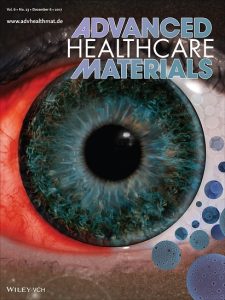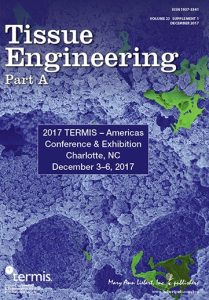In one week in December 2017, Steven Little, PhD, Chairman of the Department of Chemical and Petroleum Engineering and the William Kepler Whiteford Endowed Professor in the Departments of Chemical and Petroleum Engineering, Bioengineering, Immunology, and Ophthalmology, and Riccardo Gottardi, PhD, Research Assistant Professor, Center for Cellular and Molecular Engineering, Department of Orthopaedic Surgery, were co-authors on two publications that were featured on the respective journal covers. The McGowan Institute for Regenerative Medicine congratulates these affiliated faculty members on this significant accomplishment. Details follow.
 Modern Therapeutic Approaches for Noninfectious Ocular Diseases Involving Inflammation
Modern Therapeutic Approaches for Noninfectious Ocular Diseases Involving Inflammation
Michelle L. Ratay, Elena Bellotti, Riccardo Gottardi, and Steven R. Little
Advanced Healthcare Materials; 2017 Dec;6(23).
Dry eye disease, age-related macular degeneration, and uveitis are ocular diseases that significantly affect the quality of life of millions of people each year. In these diseases, the action of chemokines, proinflammatory cytokines, and immune cells drives a local inflammatory response that results in ocular tissue damage. Multiple therapeutic strategies are developed to either address the symptoms or abate the underlying cause of these diseases. Herein, the challenges to deliver drugs to the relevant location in the eye for each of these diseases are reviewed along with current and innovative therapeutic approaches that attempt to restore homeostasis within the ocular microenvironment.
 Programmed Platelet Derived Growth Factor‐BB and Bone Morphogenetic Protein‐2 Delivery from a Hybrid Calcium Phosphate/Alginate Scaffold
Programmed Platelet Derived Growth Factor‐BB and Bone Morphogenetic Protein‐2 Delivery from a Hybrid Calcium Phosphate/Alginate Scaffold
Bayer EA, Jordan J, Roy A, Gottardi R, Fedorchak MV, Kumta PN, Little SR.
Tissue Engineering Part A; 2017 Dec;23(23-24):1382-1393.
Bone tissue engineering requires the upregulation of several regenerative stages, including a critical early phase of angiogenesis. Previous studies have suggested that a sequential delivery of platelet-derived growth factor (PDGF) to bone morphogenetic protein-2 (BMP-2) could promote angiogenic tubule formation when delivered to in vitro cocultures of human umbilical vein endothelial cells (HUVECs) and human mesenchymal stem cells (hMSCs). However, it was previously unclear that this PDGF to BMP-2 delivery schedule will result in cell migration into the scaffolding system and affect the later expression of bone markers. Additionally, a controlled delivery system had not yet been engineered for programmed sequential presentation of this particular growth factor. By combining alginate matrices with calcium phosphate scaffolding, a programmed growth factor delivery schedule was achieved. Specifically, a combination of alginate microspheres, alginate hydrogels, and a novel blend of resorbable calcium phosphate-based cement (ReCaPP) was used. PDGF and BMP-2 were sequentially released from this hybrid calcium phosphate/alginate scaffold with the desired 3-day overlap in PDGF to BMP-2 delivery. Using a three-dimensional coculture model, we observed that this sequence of PDGF to BMP-2 delivery influenced both cellular infiltration and alkaline phosphatase (ALP) expression. It was found that the presence of early PDGF delivery increased the distance of cell infiltration into the calcium phosphate/alginate scaffolding in comparison to early BMP-2 delivery and simultaneous PDGF+BMP-2 delivery. It was also observed that hMSCs expressed a greater amount of ALP+ staining in response to scaffolds delivering the sequential PDGF to BMP-2 schedule, when compared with scaffolds delivering no growth factor, or PDGF alone. Importantly, hMSCs cultured with scaffolds releasing the PDGF to BMP-2 schedule showed similar amounts of ALP staining to hMSCs cultured with BMP-2 alone, suggesting that the sequential schedule of PDGF to BMP-2 presentation promotes differentiation of hMSCs toward an osteoblast phenotype while also increasing cellular infiltration of the scaffold.
Congratulations, all!
Read more…
University of Pittsburgh Swanson School of Engineering News Release
